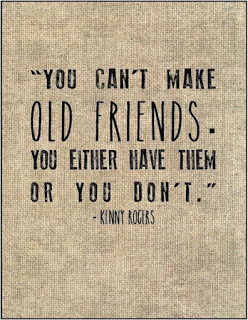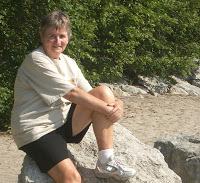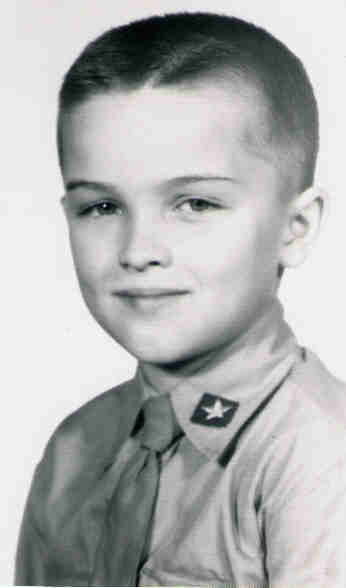Gifts from Afar, by Gillian
All through school it was the four of us. We took classes together, sat together on the bus to and from school and on field trips, ate lunch and played tennis together. Then, in our teens, circumstances began to separate us. Molly’s family needed her to go to work, so she left school at sixteen – perfectly legal in Britain then and now, and not looked on as something completely negative as it is here. The other three of us stayed on till eighteen, when Rose started working and Sarah and I went off to different universities. So in one sense there ended our togetherness; in another sense it did not. The four of us always got together for a picnic, or drinks at the pub, whenever Sarah and I were home for Xmas or summer vacation. Then, after we graduated, Sarah married and she and her husband emigrated to Australia. Shortly after that, I came to the U.S.
Now we were well and truly separated.
But we were not. Each of us continued faithfully to write nice long letters. It was always with great delight that I spotted a gift from afar in the form of an envelope with a Brit or Aussie stamp on it, lying in the basket beneath the mail slot, just as it now delights me to see one of their names languishing in my e-mail inbox. We remembered each other’s birthdays and faithfully sent Xmas cards, as we still do, although I have to admit they have become somewhat predictable. The two from Britain are almost always of those cute little English robins. The one from Australia is inevitably some summer-Santa scene, perhaps a surfing or sailing Santa, to remind those of us in the Northern Hemisphere that an Australian Xmas comes along at the height of summer. I saw Rose and Molly relatively often over the years as we got together whenever I returned home, but have only managed to see Sarah twice in the fifty years since we both left. Once in the seventies we managed to coordinate our trips home to see our parents, and in the eighties I visited her in Sydney.
The four of us have always been there, albeit long-distance, for each other through triumph and tragedy. I know I can rely on those gifts from afar, the heartfelt congratulations or sympathy, whatever happens, and they feel the same. It began when Rose, at eighteen, became pregnant. She was unmarried and her father threw her out of the house. The other three of us immediately rallied round. Pretty soon her father relented and welcomed her back, and although we liked to think our support for Rose made him relent, I doubt that it really carried any weight with him at all. Very few weeks later, as it was done in those days, Rose and the father of her baby married and have lived happily together, as far as the other three of us know, for over 50 years. They operate their farm in such an environmentally-friendly way that environmentalists from all over the world visit them. Recently they were honored for their efforts at a tea-party at Buckingham Palace. More cards and letters!
Molly married, but found that she could never have children. Cards and caring letters flew across the miles. Two years ago she had a mastectomy, and although she made light of it we sent the sympathy cards and encouraging letters.
I came out to my distant friends and was rewarded with loving, supportive, replies by return of mail. I had debated the importance of telling them, we shared so little, in fact nothing, of each other’s daily lives by then, but I felt that our close friendship deserved better; I was right. They have not had the chance to meet Betsy, but always include a cheery love to Betsy as they end their correspondence, and upon receipt of our wedding movie in 2013 the loving congratulations were immediate and sincere.
Poor Sarah and her husband have had the saddest stories to tell. They had two children, both boys. One fell down some steps in his teens and broke his neck. There was apparently a suspicion of substance abuse; he had always been a troubled kid. Then, a year ago, the older son died, in his forties, after a long struggle with leukemia. The cards and letters flew across the miles once more. I was dumbfounded by the strength of my grief. How could I feel so much for someone I had seen twice in the last fifty years? Fortunately for Sarah and Noel, their beloved son left them with two grandchildren and a daughter-in-law with whom they are very close. Life goes on.
I am invariably proud of my friends. Not proud of myself for choosing so wisely. The four of us were friends less from choice than as a result of geography. No, I am proud of them for who they are. In their strength and wisdom and caring, they never disappoint.
We have little in common, the four of us. You don’t have to have anything in common with people you’ve known all your life; you’ve got your whole life in common. Lionel Blue says,
“Old friends die on you, and they’re irreplaceable. You become dependent,” and I do so dread the day the first one of the four of us dies.
On being told that Facebook is a great way to keep in touch with old friends, Betty White quipped,
“.. At my age, if I wanted to keep in touch with old friends, I’d need a Ouija board”
Both Rose and Sarah have mothers still in good health well into their nineties, so I doubt, thankfully, that I will be the one left holding the board.
© May 2015
About the Author
I was born and raised in England. After graduation from college there, I moved to the U.S. and, having discovered Colorado, never left. I have lived in the Denver-Boulder area since 1965, working for 30 years at IBM. I married, raised four stepchildren, then got divorced after finally, in my forties, accepting myself as a lesbian. I have now been with my wonderful partner Betsy for 25 years.
Solitude Began Long Ago and Far Away by Ricky
body, of the mind, and of both the mind and body simultaneously. There are two sub categories of solitude:
self-imposed and externally imposed. Each
of these categories and sub categories have degrees of effect and affectation
upon a person.
following are examples:
|
TYPES
|
SELF-IMPOSED
|
EXTERNALLY
IMPOSED |
|
Solitude
of the Body |
Shutting oneself away from
contact with others; a hermit like existence. |
Imprisoned; trapped by a
natural disaster; shipwrecked on a deserted island. |
|
Solitude
of the Mind |
Tuning out distractions while
reading or watching a movie; being in a crowd but feeling alone. |
Being alone (not by choice)
with no TV, radio, telephone, or other common objects to occupy one’s thoughts; being deaf and blind; being in a coma; Alzheimer’s Disease. |
|
Solitude
of Both the Mind & Body |
Becoming a hermit and
eschewing all means of communication with the “outside” world. |
Being stranded somewhere without
resources or companionship. |
solitude several times in my life beginning long ago and far away in 1953 at
the Hawthorne Christian School in Hawthorne, California. My withdrawal from personal contact with
other peers occurred as the result of being punched in the stomach by someone I
thought was a friend. I learned that my
peers were not safe. Since my father was
the disciplinarian in our family, I already knew that I was not safe around
adults either.
when my father informed me of his divorce from my mother. In spite of two loving grandparents and a
sympathetic uncle, I realized that I was alone in a world where nothing is
safe, secure, or permanent.
moderate solitude of the body became complete until I left home for military
service. From the time my mother and
step-father came to Minnesota and returned me to Lake Tahoe, California, I have
been what most people would classify as a “loner”. Living for my first summer at the Emerald Bay
Resort, I had no peer interaction except for the occasional young passengers on
my step-father’s tour boat.
old I could properly care for my infant twin brother and sister, I became the
live-in babysitter for the next 9-years, which severely limited my after school
social life. Still, I was not lonely but
I did learn to entertain myself with books and games with my siblings. If I was not reading or playing, I
entertained myself in other ways. If
anyone else had been around, they would have said of me that I was the “poster
child” for the saying, “Idle hands are the Devil’s workshop.” I engaged in many risky behaviors. The only reason I did not eventually end up
in reform school, was that I joined the Boy Scouts.
Patrol Leader, I had to set an example and thus did not have any close scout
friends. I was closer to the scoutmaster
than any of the boys. He was my “father
figure” in the absence of my real father and step-father.
and continued to remain aloof from others (still being in the closet didn’t
help). My philosophy on friendship (due
to all the situations previously mentioned), was “I will be a friend but the
other person had to make the first move”.
Apparently, nearly everyone I liked was doing the same so friendships
failed to materialize.
and we became good friends before we married.
I had a good life with her, but I still was not thriving and was playing
a lone hand. After she passed away, I
lost my joy of life and withdrew from everything I loved to do for 10-years
before I finally came out of depression.
ago and far away, but it has followed me even to this day. One other thing I’ve learned about solitude —
I don’t like it one little bit. I crave
companionship for everything I like to do by way of entertainment. I have only minimal fun doing things alone. I am beginning to thrive but still have a
long way to go. Perhaps if I live long
enough, I will be able to state, “I left my solitude long ago and far away.”
Lawndale and then in Redondo Beach. Just
prior to turning 8 years old in 1956, I began living with my grandparents on
their farm in Isanti County, Minnesota for two years during which time my
parents divorced.
in 1958, I lived first at Emerald Bay and then at South Lake Tahoe, California,
graduating from South Tahoe High School in 1966. After three tours of duty with the Air Force,
I moved to Denver, Colorado where I lived with my wife and four children until
her passing away from complications of breast cancer four days after the 9-11
terrorist attack.
therapeutic.



